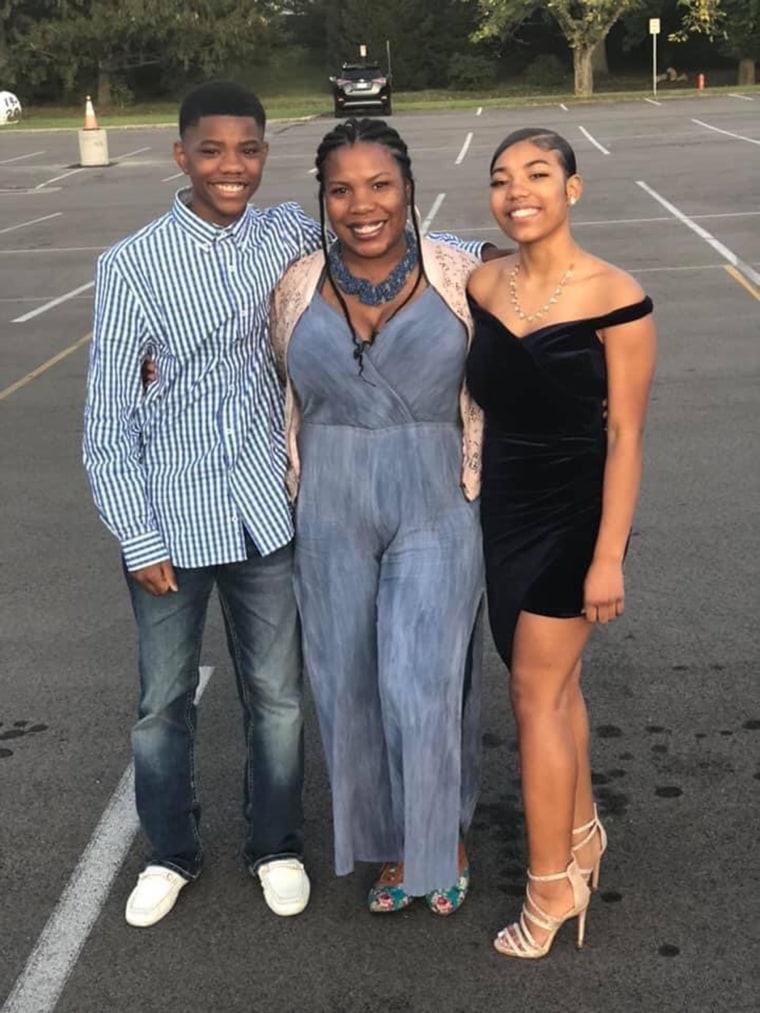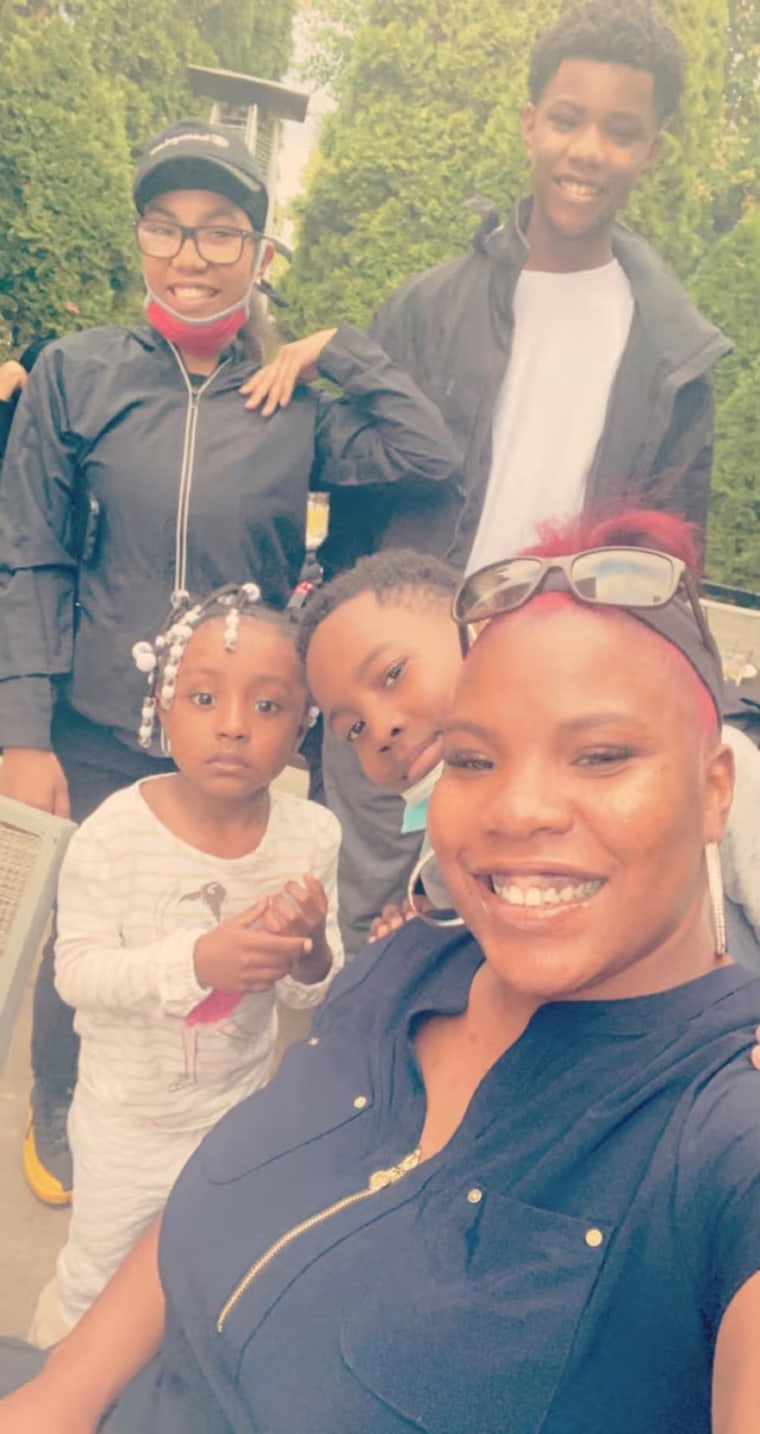When Amber Broadus was pregnant with her third child, she was in a tough place. Her mother had recently died and Broadus coped by partying a lot and dropping off her children with relatives for long periods of time. Child services launched an investigation and she realized she needed to get her life together for her family.
Then she heard about a program called Moms2B and after meeting with the group, she decided to join. The program, created by The Ohio State University in 2010, provides prenatal classes and support for expecting women.
“I appreciate the program’s education and research,” Broadus, 36, a community initiative coordinator at the YMCA in Columbus, Ohio, told TODAY.

But more importantly, she said Moms2B helped her believe in herself as a mother and value her children. She said program employees were the first in her life to congratulate her for being pregnant. That small gesture of kindness changed her.
“Those skills and that mindset ultimately had an impact on my life because I always looked at my children as a burden,” she said. “They made me realize that my children are gift.”
She had a healthy baby boy, Daniel, now 9, and then a healthy girl Natalie, 4. She feels intensely grateful for the help from Moms2B.
“I had a place to thrive,” she said. “It just helped me align with some values.”
Infant mortality remains high for Black, Hispanic mothers
Maternal and infant mortality rates in the United States remain persistently high with Black and Hispanic mothers experiencing higher rates of both. Pregnancy-related deaths for Black women are three to four times higher than for white women in the United States, according to the Centers for Disease Control and Prevention. Black infants die at twice the rate as white infants.
“Hispanic and Black women experience the highest rates of maternal morality and the highest rates of infant mortality,” Dr. Hyagriv Simhan, division director of maternal-fetal medicine and vice chair of obstetrical services at Magee Womens Hospital of UPMC in Pittsburgh, who is not involved with Moms2B, told TODAY. “There are a variety of risk factors for infant mortality and the difference in these risk factors explain some of the differences by race. But there are unexplained differences by race that go beyond traditional medical risk factors.”
Various programs have tried addressing such differences. One of those methods? Changing models of prenatal care.
“Prenatal care is doing what we can to optimize outcomes and narrow these disparities,” Simhan said.
Moms2B is one such program trying to address differences in infant mortality. Dr. Patricia Gabbe started the “neighborhood-based” pregnancy program a decade ago to examine the high infant mortality rate in Columbus, and Broadus was one of the first moms in the program.
“We began in 2010 to learn from predominately Black women to better understand why there was such a disparity. Why do two to three times more Black babies die than white babies?” Gabbe said. “We started in a neighborhood church in a very high-risk neighborhood, with high infant mortality rate of over 15 per 1,000.”
While the researchers hope to gain more insight into infant mortality, Moms2B also provides support and education to expecting women. They have access to a multidisciplinary team of medical professionals, including doctors, nurses, nutritionists, community health workers and child development specialists.
“We’ve developed a pretty standardized curriculum that we’ve replicated and used in eight neighborhoods in Columbus,” Gabbe said.
A recent paper looking at the program showed a slight decline in infant mortality rates of program participants. Published in Maternal and Child Health Journal, the paper does not find a huge difference between for infants of moms in the program and infants of moms who were not, said Simhan, but he is glad that the program is being examined.
“(The researchers) did not demonstrate statistically that outcomes were better in individuals who were in Moms2B versus those who didn't participate,” he said. “They emphasize that it trends towards positivity. It might be beneficial, but technically it didn't statistically meet the mark.”
It’s likely because the reasons behind higher infant mortality for Black and Hispanic babies are so complex that a variety of approaches are needed to address it.
“These are really deep seated pregnancy problems and deep seated disparities and the solutions are likely multifactorial,” Simhan said. “Trying to optimize engagement, reduce barriers to participation, increase or optimize the experience, but also deliver health care outcomes to people … is a good goal.”
Moms feel grateful for the help
But for participants such as Broadus, the program is transformative. She recalls staff members helping moms with the little things, such as finding affordable laundromats for moms or taking them to doctor’s appointments. Gabbe said moms in the programs also benefit by having staff that can help them better advocate issues that arise to their physicians. And, because they interact with the moms so often they can easily spot potential health problems, such as preeclampsia, and get the women help earlier.
“Because we are multidisciplinary, we are able to identify (problems). Like this mom may have swollen ankles. She may have a headache. She may even have trouble with her vision,” Gabbe explained. “We have saved mothers' lives especially in the postpartum period … We have saved maternal lives as well as infant lives."

Broadus feels grateful for Moms2B and the work its doing for families like hers.
“It was so important for them to be able to reach the African American babies to see what was causing our babies to die. We’re all vulnerable,” she said. “I just truly appreciate the program and what they taught me.”